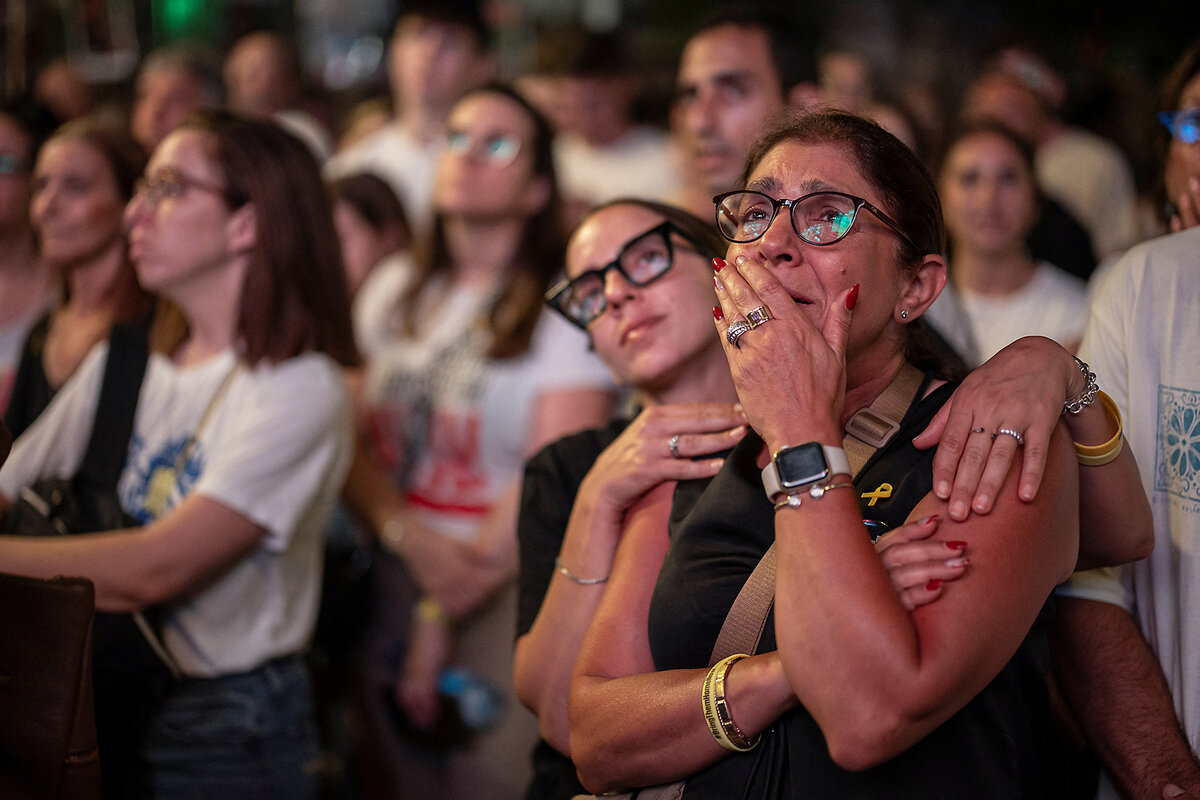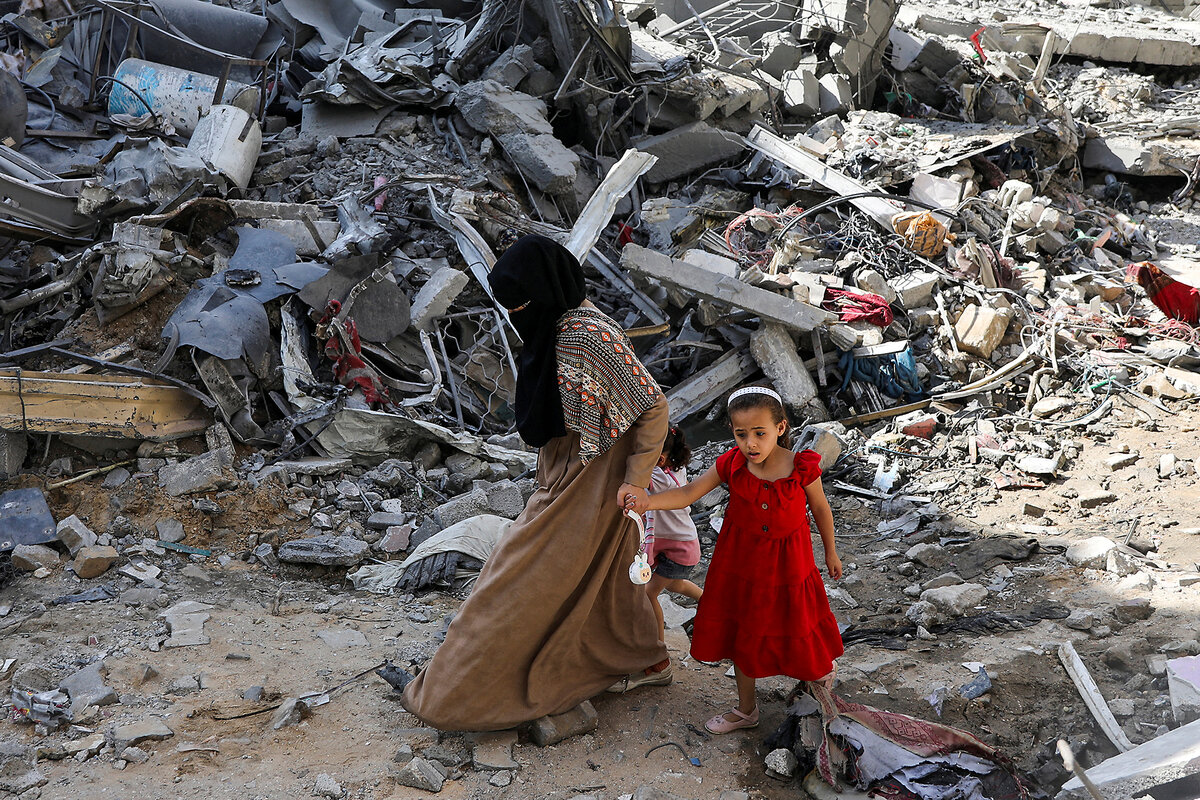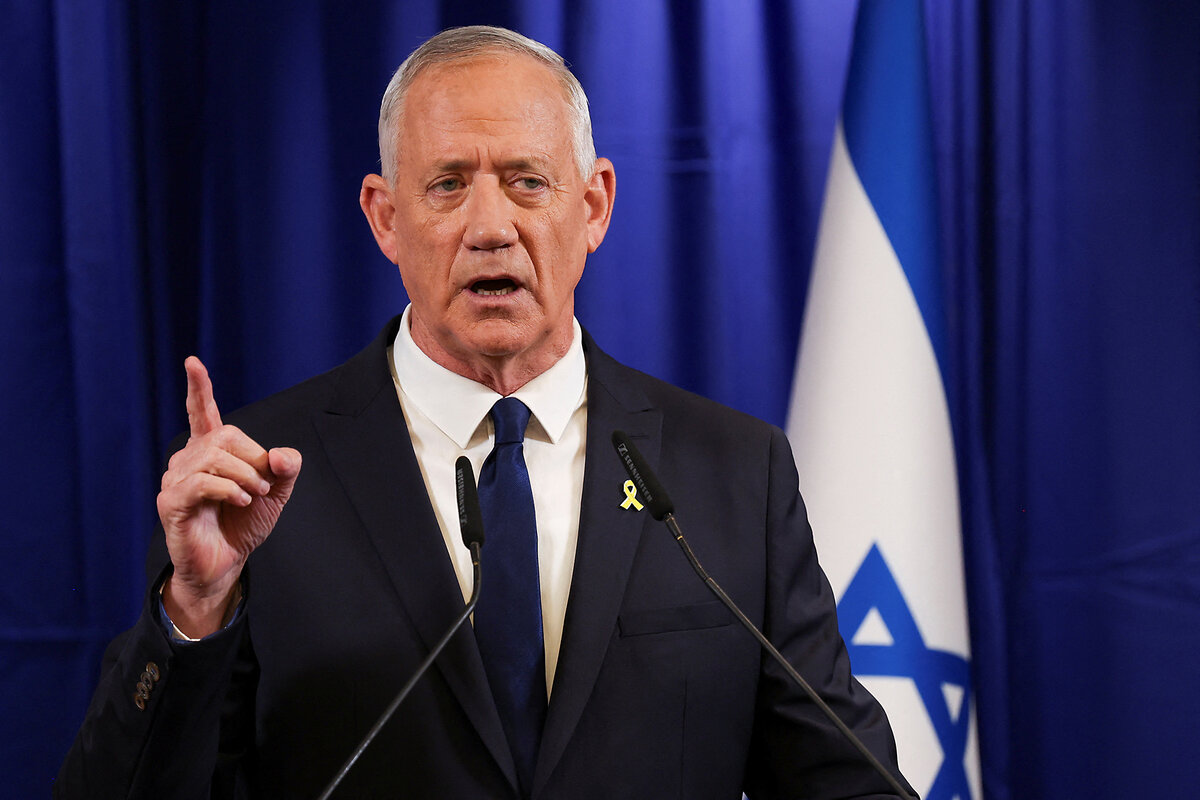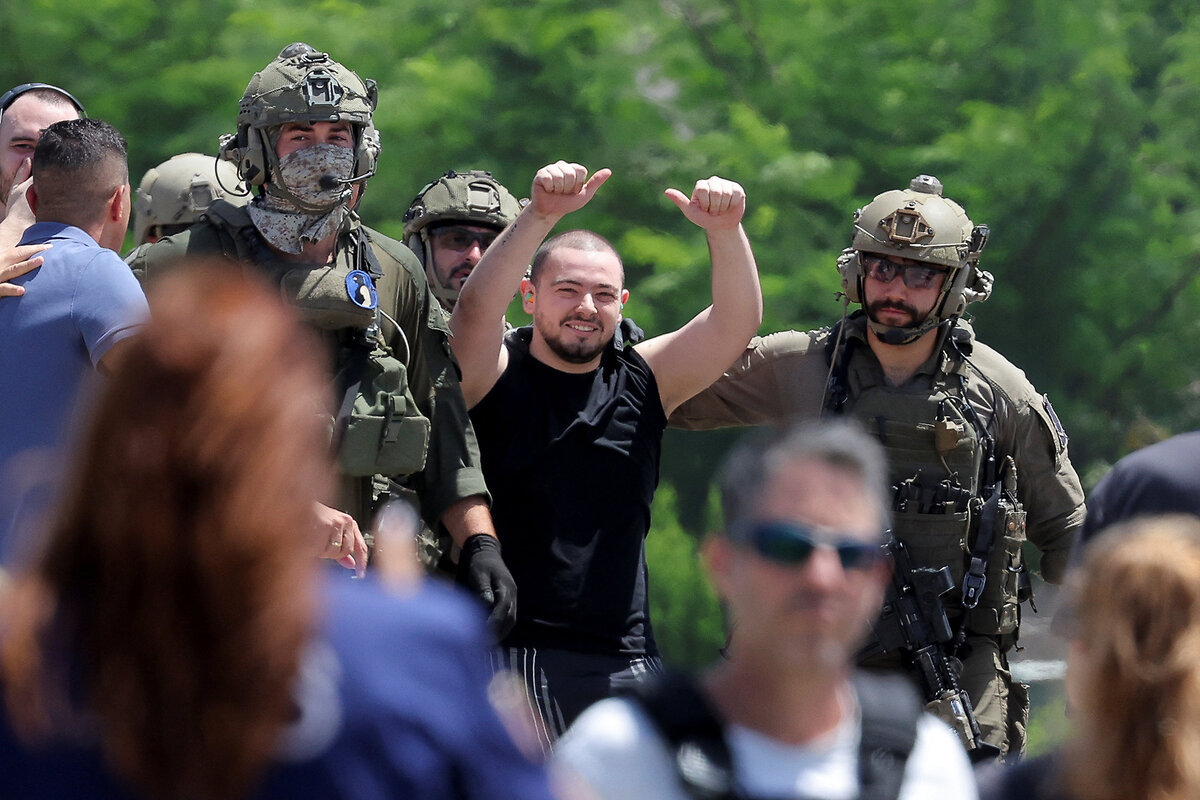Why Israeli relief over hostages’ rescue from Gaza was short-lived
| Tel Aviv, Israel
Israelis erupted in a spontaneous outpouring of joy Saturday as news broke over the dramatic rescue of four hostages held by Hamas. But the euphoria was short-lived, as it quickly became clear that none of Israel’s remaining challenges from the war in Gaza – military, diplomatic, or political – had been materially altered.
Prime Minister Benjamin Netanyahu came under immediate fire from hostages’ advocates and others for politicizing the release. Former military chief Benny Gantz pulled his centrist party from the government over its failure to adopt a day-after plan for Gaza. And Monday it was reported the Biden administration was trying to negotiate a side deal with Hamas to secure the release of American citizens still held hostage.
Israelis were whipsawed from grief to joy and then back to grim reality in mere hours.
Why We Wrote This
A story focused onThe emotion that swept Israel Saturday after the electrifying news that four hostages had been brought home to safety from Gaza was pure joy. But within hours, the unresolved questions raised by the war against Hamas had reasserted themselves.
Just days before the rescue, Israelis had learned that four other hostages, who had been seen alive in Hamas propaganda videos, had died in captivity.
On Saturday, the nation breathed a huge sigh of relief at the news that commandos had liberated four living hostages. A veteran TV journalist burst into tears in a live broadcast, lifeguards announced the news by megaphone to cheering beachgoers, and people grabbed flags to pour dancing into the streets.
But by nightfall Saturday, a grim reality once again cloaked the nation: Israelis fretted over the remaining 120 hostages and over widening social and political cracks, the high human and economic toll of Israel’s longest war, and the nation’s increasing global isolation, made worse as the reported Palestinian death toll from the rescue operation surged past 200 people.
The successful rescue of four living hostages was a “sweet drop of water in a sea that is salty,” says Eyal, an Israeli demonstrator giving only his first name and sitting on the pavement at an antigovernment protest in Tel Aviv Saturday night.
There are “security, economic, social, and international relations” issues that need to be urgently addressed to get the nation back on its feet, he says gloomily. “We need a lot of work and a lot of hope.”
Pressure on Netanyahu
Mr. Netanyahu has come under intensified criticism at home and abroad for his conduct of the war. And Mr. Gantz, in his resignation announcement, and U.S. President Joe Biden, in an interview last week, both gave support to the contention that the prime minister has prolonged the war for political gain. After eight months, the war aims of rescuing the hostages and breaking down Hamas’ military and governing abilities still seem distant.
On Monday, NBC News reported that Biden administration officials have discussed negotiating a deal with Hamas to release five American hostages held since Oct. 7 if current efforts to secure an Israeli-Hamas cease-fire fail. Secretary of State Antony Blinken arrived in the region Monday to promote a cease-fire deal previously outlined by President Biden that holds the promise of a longer and broader settlement. At the United Nations, the Security Council passed a resolution Monday afternoon endorsing the U.S.-backed cease-fire plan.
If the NBC report is accurate, “it would be dramatic news,” says Professor Gideon Rahat, chair of the political science department at the Hebrew University in Jerusalem. “Israel sees itself as the safe haven for Jews globally. But now it is President Biden, and not the Israeli government, that is saving the Jews.”
“It is clear that this is a leak that is meant to pressure Mr. Netanyahu to agree to a cease-fire deal,” Professor Rahat says.
In his resignation announcement Sunday night, Mr. Gantz accused Mr. Netanyahu of preventing Israel from “advancing to real victory” and called for early elections.
The departure of Mr. Gantz’s National Unity Party from the emergency government is not expected to pose an immediate risk to the right-wing coalition, which still has 64 seats in the 120-seat Knesset, says Professor Rahat.
“What it will do is increase even further Israel’s international isolation, as Mr. Gantz and his party were seen as the responsible adults, the voice of reason, within the government,” he says. But Mr. Netanyahu “likes this global isolation,” he says. “He likes to show Israelis how strong he is vis-à-vis a hostile world. It works for him.”
Professor Rahat says it is likely that Mr. Netanyahu will try to add opposition members to his government. “This will allow him to juggle opposing views within his government and in this way buy time, which is what he wants. He tries to buy time.”
Yohanan Plesner, president of the Israel Democracy Institute, said in a statement that the departure of Mr. Gantz’s party from the coalition “is incredibly consequential to Israeli politics.” The participation of Mr. Gantz and his team at critical junctures of war decisions gave a “broad swath [of] Israelis a higher level of confidence that critical wartime decisions were being made with moderate voices in the room and broad national representation, rather than narrow political interests.”
Photo ops
Meanwhile, Mr. Netanyahu came under much public criticism for rushing Saturday to meet the just-freed hostages and publishing those images for political gain, while he has not yet met the bereaved family members of hostages who have died.
Avi Marciano, the father of hostage Noa Marciano, whose body was retrieved by soldiers, said in a Facebook post that he is “happy with all his heart for all the families who got to embrace their loved ones. I’m also jealous. This highlights how our ending was bad. When it ends badly, the prime minister doesn’t come. He also doesn’t call.”
Among the hostages freed Saturday was Noa Argamani, who was seen Oct. 7 being rushed away from the site of an outdoor concert on a motorcycle sandwiched between militants as she cried out, arms outstretched, for help. Israeli commandos rescued her and the others from civilian homes in the midst of the Nuseirat refugee camp in central Gaza.
The rescue mission has underlined the complexity of freeing prisoners held either underground or among civilians, highlighting for many the urgent necessity of a deal to get back the remaining 120 hostages, many of whom are deemed to be already dead. Since Oct. 7, 2023, when more than 250 people were taken hostage by Hamas, just seven have been rescued alive. More than 100 others were released under a temporary cease-fire deal, which eventually broke down. Three others were mistakenly killed in December by Israeli troops.
Israel Defense Forces spokesperson Daniel Hagari said Saturday that the “heroic” and “high-risk” mission was based on precise intelligence for which commando teams prepared for weeks.
The commander of one rescue squad was fatally wounded in the operation by heavy Hamas fire. The Hamas-run health ministry in Gaza said the raid killed more than 270 people, including children and other civilians, from heavy artillery barrages and airstrikes.
The rescue sends a “very strong signal” to Israel’s enemies about its military capabilities, says Avi Kalo, a lieutenant colonel in the reserves and a former head of the military intelligence department dealing with soldiers missing in action. But “it does not significantly improve” Israel’s strategic situation regarding the war, and certainly not with regard to the hostages held by Hamas, he said Sunday at a briefing with journalists.
Rescue options limited
An operation such as the one executed Saturday “cannot be the platform to return all the hostages, whose time in the tunnels is running out,” Mr. Kalo said. Hamas is now likely “tightening its guard” over the remaining hostages and will draw lessons from the “loopholes” that led to their rescue, he said.
A Hamas spokesperson said in a statement Saturday that the Israeli operation will pose a “great danger” to remaining hostages and negatively impact their conditions and lives.
Rear Admiral Hagari, the Israeli military spokesperson, voiced doubt that more such operations would follow, given their complexity and requirements.
“We know that we can’t do operations in order to rescue all of them because there aren’t always the conditions that allow that,” he said at a briefing Saturday. “We saw in the past that what brought us the biggest number of hostages was a deal.”
At the Tel Aviv demonstration Saturday night, protester Miri Pinchuk concurred. The rescue was “a very good and emotional intermezzo” in the saga of Israel’s woes, she says, but it will not have any “long-term impact” on Israel’s future. “We need an overall political solution that will build a new reality here instead of hate and war.”









